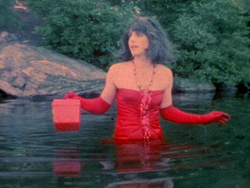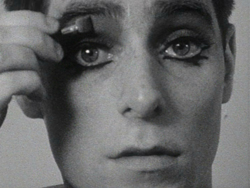

Beautiful People
David Wojnarowicz with Jesse Hultberg
1988, 34:57 min, b&w and color, silent, Super 8mm film on video
Beautiful People
David Wojnarowicz with Jesse Hultberg
1988, 34:57 min, b&w and color, silent, Super 8mm film on video
Description
Beautiful People follows Jesse Hultberg, Wojnarowicz’s former bandmate in 3 Teens Kill 4, as he dresses in his drag persona, the hippie-era singer Melanie Safka, and departs New York City for an upstate lake. Primarily shot in black and white, most of the film focuses on Hultberg’s attentive preparation as he applies makeup and selects his gown and jewelry. In the taxi, passing views out the window shift from scenes of the city to the tree-lined highway. Arriving at a forest, Hultberg cautiously navigates the uneven terrain in stilettos, with a glamorous presence in distinct contrast to his surroundings. Sitting on the rocky lakeshore, Hultberg reaches his gloved palm toward the water. Upon contact, the film immediately shifts into color, revealing the vibrant red fabric of the gown and gloves. This colorful awakening marks the film’s melancholic end, as the final shot captures Hultberg disappearing into the water.
Wojnarowicz, a dedicated activist in addition to artist, “[saw] drag queens as true revolutionaries who fuck with visual codes of gender.” His film foregrounds the expressive and radical potential of drag in the midst of the AIDS epidemic. Hultberg’s solitary performance also speaks to the isolating experiences of those who contracted AIDS and lost support from their families, workplaces, and the government.
Beautiful People was first presented at La MaMa Experimental Theatre Club in New York City for their “One Night Stand Series.” The silent film was accompanied by a live sound performance by Wojnarowicz and Hultberg and a selection of songs, including Safka’s folk-rock song “Beautiful People,” with lyrics resonating bittersweetly with the content of the film: “Beautiful people / You ride the same subway as I do every morning / That's got to tell you something / We've got so much in common / I go the same direction that you do / So if you take care of me, maybe I'll take care of you.”
This film was preserved with the support of the New York State Council on the Arts. State of the Arts NYSCA. The Fales Library & Special Collections New York University, New York, New York.